One of the key ingredients that often takes center stage in baking recipes but may need replacement for various reasons is the humble egg. If you cannot eat eggs due to egg allergy, dietary restrictions, or simply the desire to explore new flavors and textures, the quest for egg substitutes has led to an array of creative solutions.
In this guide, I will share the best egg substitutes, uncovering the egg replacement that can seamlessly step into the shoes of eggs in various culinary applications.
The 14 Best Egg Substitutes For Egg-Free Recipes
Silken Tofu
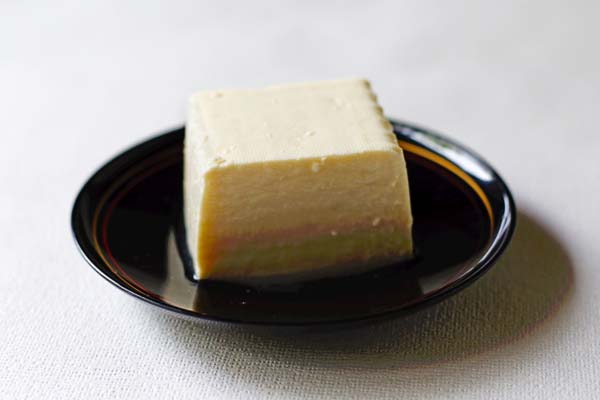
Silken tofu, known for its creamy texture and neutral flavor, is a remarkable egg substitute in many recipes. The magic of silken tofu lies in its ability to mimic the binding properties of eggs while maintaining a light and tender texture in baked goods.
To replace eggs, blend 1/4 cup of silken tofu until smooth and use it as an equivalent measure. This substitute shines in recipes where eggs are binding agents and contribute to moisture.
Furthermore, it offers a healthy dose of plant-based protein, making it a go-to option for vegans and those looking to reduce their egg consumption. Whether you're catering to dietary preferences or exploring new culinary horizons, silken tofu is a reliable and nutritious egg substitute ready to elevate your recipes.
Mashed Banana
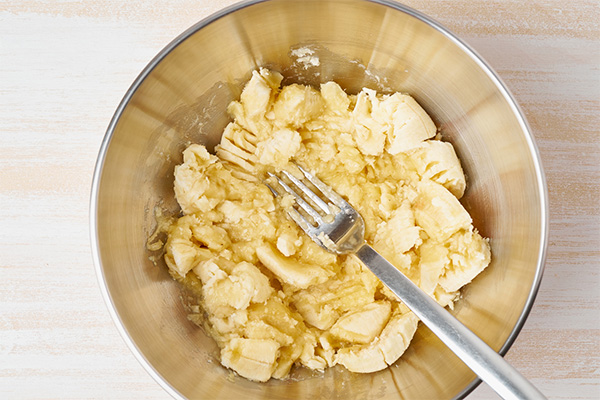
Mashed bananas are a delightful and naturally sweet egg substitute, celebrated for their ability to add a touch of fruity flavor and moisture to various recipes. The charm of mashed bananas lies in their versatility and inherent sweetness, making them an excellent choice for recipes where a hint of banana flavor complements the overall taste.
To replace one egg, simply mash 1/4 cup of ripe banana until smooth and creamy. Mashed bananas also serve as a fantastic binding agent, ensuring that your dishes maintain the desired texture.
Mashed banana caters to those with dietary restrictions and brings a natural sweetness and moistness that can enhance the appeal of your culinary creations. It's particularly well-suited for baking endeavors, such as muffins, quick bread, cookies, and pancakes.
Applesauce
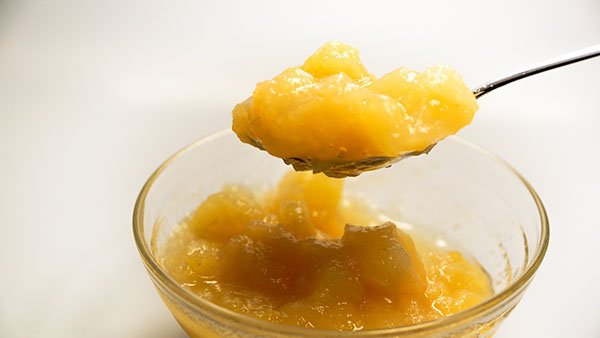
Applesauce is a versatile and health-conscious substitute for eggs in baking. Its appeal lies in its ability to add moisture to baked goods while imparting a subtle apple flavor that pairs well with various recipes.
To substitute for one egg, use 1/4 cup of unsweetened applesauce. It's an excellent choice for vegan or plant-based baking and works exceptionally well in recipes like muffins, cakes, and brownies. The natural sugars in applesauce can also reduce the overall sugar content of a dish, making it a health-conscious alternative.
Moreover, its smooth texture ensures seamless integration into your recipes. Whether you're looking to reduce your egg consumption, accommodate dietary preferences, or simply enhance the moistness of your baked goods, applesauce is a dependable and wholesome egg substitute.
Yogurt
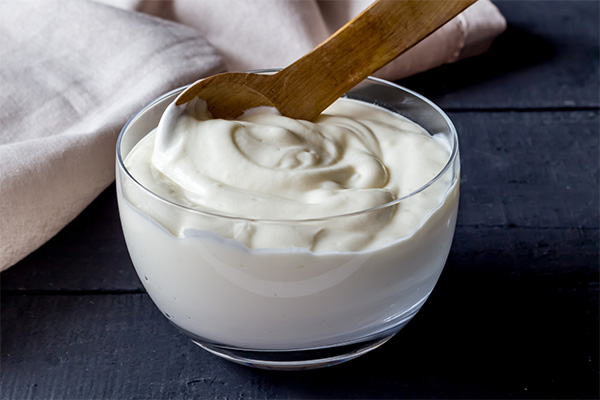
Yogurt is one of the best egg substitutes as it is dependable and protein-rich, renowned for its versatility in various recipes. The beauty of yogurt as an egg substitute lies in its creamy consistency and the mild tang it adds to dishes. It's an excellent choice for recipes requiring moisture, binding, and leavening properties, such as baking cakes, muffins, or pancakes.
To replace one egg, use 1/4 cup of plain yogurt. Yogurt's ability to maintain a tender crumb in baked goods and its natural acidity can also enhance the texture and flavor of various dishes.
Whether you're accommodating dietary preferences or seeking to reduce cholesterol in your recipes, yogurt steps in as a nutritious and flavorful alternative to eggs. Its versatility and ability to contribute to both savory and sweet dishes make it a valuable addition to your culinary toolkit.
Buttermilk

Buttermilk is a versatile and tangy egg substitute, valued for its unique flavor and acidity in various culinary applications. The appeal of buttermilk as an egg substitute lies in its ability to add moisture, tenderness, and a slight tang to recipes. It is particularly well-suited for baked goods such as muffins, pancakes, and waffles, where leavening and flavor enhancement are desired.
To replace one egg, use 1/4 cup of buttermilk. Buttermilk's natural acidity also helps leaven baked goods, yielding a light and tender texture.
Buttermilk is especially popular in southern-style cooking and is a staple in recipes like biscuits and cornbread. Its versatility and distinct flavor make it a preferred choice when you're looking to infuse a unique taste and texture into your culinary creations.
Oil, Water, And Baking Powder
The combination of oil, water, and baking powder as an egg substitute in baking works effectively because it addresses the key functions that eggs typically perform: leavening, moisturizing, and binding.
The oil provides fat, which contributes to the richness and tenderness of the baked goods, while water adds the necessary moisture. Baking powder acts as a leavening agent, introducing air into the mix and helping the baked item to rise, similar to what eggs would do. This mixture is particularly useful in recipes like cakes, muffins, or bread, where the structure and moistness are crucial.
For each egg to be replaced, use 2 tablespoons of water, 1 teaspoon of oil, and 2 teaspoons of baking powder, adjusting as needed depending on the recipe's requirements. This substitute is most effective in recipes where eggs are not the main ingredient but serve to enhance the texture and cohesiveness of the final product.
Vinegar and baking soda
Using vinegar and baking soda as an egg substitute in baking is effective because of the chemical reaction between these ingredients that produces carbon dioxide, creating bubbles that help the batter rise and become light and fluffy. This reaction is similar to the leavening action of eggs in baked goods.
To replace one egg, a common measurement is to combine 1 tablespoon of vinegar with 1 teaspoon of baking soda. This substitution works best in recipes where the egg's main role is leavening, such as in cakes, muffins, and quick bread, rather than in recipes where eggs are needed for binding or adding richness.
Vinegar and baking soda are especially useful in vegan baking or for those with egg allergies. While this mix doesn’t replicate the taste of eggs, it provides the necessary lift and airiness to achieve a desirable texture in baked products.
Chia Seeds

Chia seeds are one of the best shelf-stable egg substitutes, celebrated for their natural binding and moisture-retaining properties. To substitute for one egg, combine one tablespoon of chia seeds with 2.5 tablespoons of water, letting the mixture sit for a few minutes until it achieves a gel-like consistency.
The attractiveness of chia seeds as an egg substitute stems from their capacity to form a gel when mixed with water, replicating the binding properties of eggs in recipes. This makes them an excellent choice for vegan or plant-based baking, as well as for those with egg allergies.
Chia seeds add a subtle nutty flavor and are packed with essential nutrients like omega-3 fatty acids and fiber. They work well in various recipes, from pancakes and muffins to cookies, and even as a binder in veggie burgers.
Ground Flaxseed
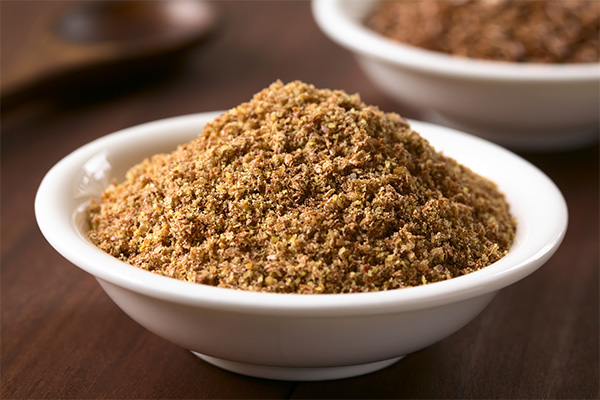
Flax seeds have gained recognition as a top-tier egg replacement, admired for their binding properties and nutritional value. To substitute for one egg, combine one tablespoon of ground flax seeds with 2.5 tablespoons of water, allowing the mixture to sit for a few minutes until it thickens to a consistency resembling an egg's.
The appeal of "flax egg" as an egg substitute lies in its ability to form a gel-like texture when combined with water, serving as an excellent binding agent in recipes. This quality makes them a go-to option for vegans, those with egg allergies, or anyone seeking to incorporate more plant-based options into their baking recipes.
Beyond their binding prowess, flax seeds offer a dose of healthy omega-3 fatty acids, fiber, and essential nutrients. They work seamlessly in various recipes, from muffins and pancakes to cookies and homemade veggie burgers.
Commercial Egg Replacers
Commercial egg replacers have garnered popularity as a convenient and versatile egg replacement, offering consistency and reliability in various recipes. These pre-packaged products are specially formulated to mimic eggs' binding, leavening, and moisture-retaining properties in recipes. The usage typically varies depending on the brand and product. Still, as a general guideline, you'll find instructions on the packaging on how to use it to substitute for eggs in various recipes.
Additionally, commercial egg replacers are designed to be neutral in flavor, ensuring they don't alter the taste of your dishes. Whether baking cakes and muffins or whipping up a batch of cookies, these reliable substitutes offer a hassle-free and dependable alternative to eggs, making them a valuable addition to your pantry for all your culinary adventures.
Soy Lecithin
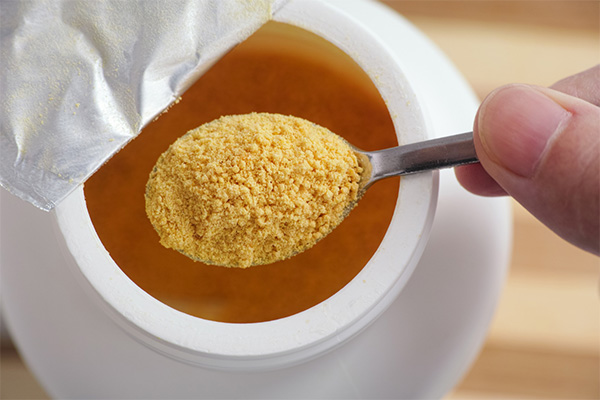
Soy lecithin emerges as a unique and effective substitute for egg yolks, particularly in recipes where emulsification and texture enhancement are crucial. While soy lecithin is not typically used as a direct one-to-one replacement for egg yolks, it can be incorporated into recipes that require emulsification, such as salad dressings, mayonnaise, or certain baked goods.
The appeal of soy lecithin as an egg yolk substitute lies in its exceptional emulsifying properties, which help bind ingredients that don't naturally combine, such as oil and water. It acts as a stabilizer and enhances the texture of various dishes, contributing to a smoother and creamier consistency. It's also flavor-neutral, ensuring it doesn't alter the taste of your recipes. When used sparingly and in the right context, soy lecithin offers a valuable alternative for achieving that desired creaminess and texture in various culinary applications.
Chickpea Flour And Water
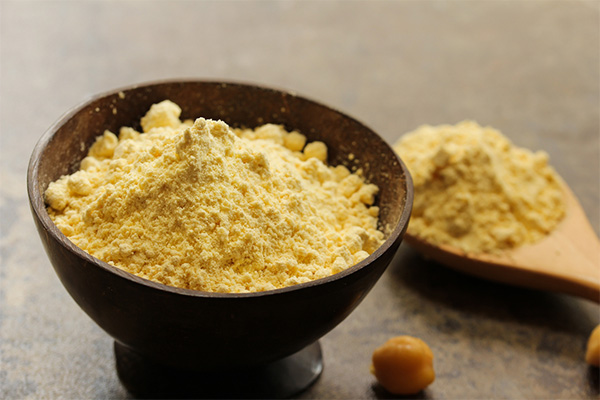
Chickpea flour is a remarkable and versatile egg yolk substitute, particularly in recipes that desire a rich and slightly nutty flavor.
To replace one egg, use three tablespoons of chickpea flour mixed with three tablespoons of water until smooth. This method is particularly effective in recipes where the egg provides structure and density, such as quiches, frittatas, or breading and frying.
The charm of chickpea flour as an egg yolk substitute lies in its ability to mimic the creamy texture and distinctive flavor of egg yolks. This makes it an excellent choice for recipes that rely on egg yolks for richness and binding properties, such as custards, mayonnaise, or certain baked goods.
Aquafaba
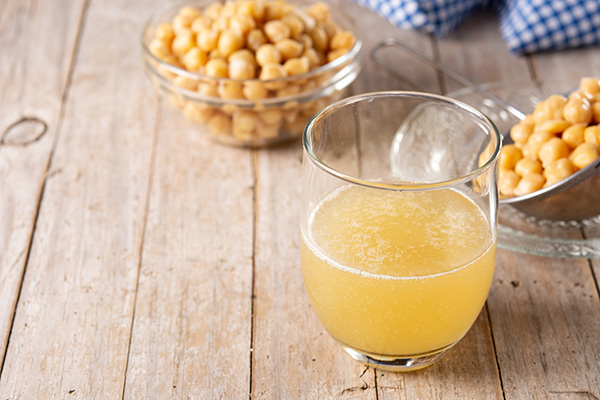
Image by chandlervid85 on Freepik
Aquafaba, the liquid derived from canned chickpeas or the cooking water of dried chickpeas, has gained widespread recognition as a remarkable and versatile egg white substitute. To replace one egg white, simply whip three tablespoons of aquafaba until it reaches the desired stiff peak consistency.
The magic of aquafaba lies in its ability to mimic the protein structure and foaming properties of egg whites, making it an excellent choice for recipes that require whipping or binding. This substitute is particularly popular in vegan and plant-based baking, as it can create meringue, macaron, angel food cake, and even mousses with remarkable success.
Aquafaba is versatile and sustainable, repurposing a byproduct that would otherwise be discarded. Its neutral flavor ensures it doesn't interfere with the taste of your dishes, making it an ideal alternative for those with egg allergies or dietary restrictions.
Arrowroot Powder
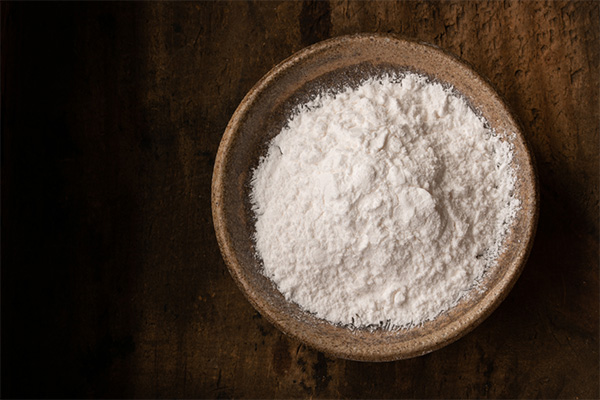
Arrowroot powder is a lesser-known but effective egg white substitute, particularly suitable for those seeking an alternative in recipes where whipping or binding properties are essential. Arrowroot powder is neutral in flavor and works seamlessly in various dishes without altering the taste. It is also suitable for individuals with egg allergies or dietary restrictions.
Mix two tablespoons of arrowroot powder with three tablespoons of water until it forms a smooth paste to substitute for one egg white.
Arrowroot powder is attractive as an egg white substitute because it can replicate the texture and binding properties of egg whites. It's a great choice for recipes like meringues, marshmallows, or other confections that rely on whipped egg whites for structure.

